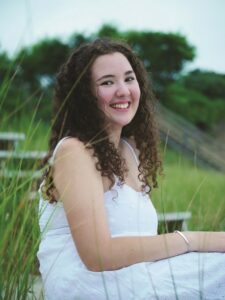Two teenagers discussed their paths out of life-threatening depression at a March 28 online forum on youth suicide prevention organized by the League of Women Voters.
Sophia Ryan, a senior at Nauset Regional High School, said she tried to take her own life during her freshman year in 2020. She appeared to be a high-functioning A student, but depression, an eating disorder, and anxiety tormented her.

“I lived off the idea of being the perfect student, the perfect friend, the perfect daughter,” she told forum participants. “I bottled everything up in the hope that it would eventually go away. And then I exploded.
“I couldn’t take being perfect anymore — I just wanted everything to stop,” Ryan said. “And then, when it got to be too much, I decided I was going to stop. I tried to commit suicide twice over the course of three months and failed twice, thankfully, because now I have the opportunity to share my story.”
Ryan said she had felt “alone, unwanted, useless, and a waste of space.”
Jack Collins, a Falmouth High School senior, had similar feelings. He was diagnosed with depression in February 2022, and that fall he became suicidal. “It just felt at that time that it would be easier for me and for my family and friends if I wasn’t here anymore,” he said. “I could not have been more wrong about that.”
Logan Hurwitz, a Barnstable High School student, said her friend Nick Eastham took his own life in 2021. She completely missed the signs of his distress because of the separation caused by the pandemic, when “school never really felt like school,” Hurwitz said.
“My teachers felt like strangers, and no one really had any motivation to do anything,” said Hurwitz. “It was hard to stay friends with some of the people who were once your best friends because of all the masks and social distance rules.”
How They Got Better
For Sophia Ryan, both of her suicide attempts were followed by three-week stays at the Attleboro Center, a 12-bed adolescent treatment program. “I made some of my closest friends there, began to learn ways to help myself when no one else could, and I met some of the most inspiring adults that have guided me to find my purpose in becoming a social worker,” she said. “But it wasn’t easy.”
Not long after her second suicide attempt in March 2020, everyone in her unit was forced to go home because of the pandemic. “It felt like a death sentence,” she said.
She sank further into depression, but the tools she had learned in treatment pulled her through, Ryan said. “I promised myself, for the sake of my family, I would not let them bury their 15-year-old daughter in the midst of a pandemic,” she said.
That fall, as a sophomore, Ryan said she was “officially friendless.”
“Hybrid school was really tough on me,” she said. “I spent the majority of my time focused on what I could control: my schoolwork and my healing. I learned a lot in that year and a half after my hospitalization.”
For Collins, two school-based programs gave him support and connection. One was Falmouth High’s Bridge Program, which made him feel “part of a family.”

The Bridge Program started at Brookline High School 15 years ago and is now in about 170 Massachusetts schools, according to Catherine Fauth, the Falmouth High school adjustment counselor, who was an adult panelist at the forum. It’s for students who are “red flagged” by the guidance department as needing a “much tighter-knit community to monitor them and give academic and mental health support,” said Fauth.
Collins also joined the Hope Squad, a national group formed to prevent suicide by using peers as role models. Falmouth High was the first in Massachusetts to adopt it, and now Cape Cod Regional Technical High School in Harwich and Barnstable High School have also joined, said Kim Mead-Walters, who was another adult panelist at the forum. Mead-Walters is executive director of the nonprofit Sharing Kindness, which introduced the Hope Squad program to Cape Cod’s schools.
Collins now serves as president of the Falmouth High Hope Squad. “We’re not therapists for others,” Collins said, “but we are there to be the first people that you can talk to, because it’s much easier to talk to a student than to a mental health professional or even a teacher.”
Ryan said Nauset High also has the Bridge Program; Ryan, some teachers, and her guidance counselor “are working to do some research” to establish a Hope Squad chapter at Nauset.
Hurwitz said she thought Barnstable High mishandled the aftermath of Eastman’s death. “The school didn’t want to say the wrong thing, so nothing was really done about it,” she said.
Mental Health Measures
“The vast majority of young people who we lose to suicide don’t want to die,” Mead-Walters said. “They need their pain to end. And as a society, we need to address the causes of deep pain.”
Sharing Kindness raises money through an annual suicide awareness walk, which last year had 400 registered participants, she said. That pays for forums like this one, as well as for clinicians who lead peer support groups. Sharing Kindness also trains Hope Squad advisers at schools.
On the state level, Sen. Julian Cyr, who was also a panelist, said that $400 million of the $5 billion in American Rescue Plan Act funds sent to Massachusetts has gone toward mental health infrastructure, and that the only category to receive more money than mental health is housing. The two are linked, Cyr said: the mental health crisis is rooted in a lack of available care, because trained clinicians cannot afford to live on Cape Cod.
“So, as you think about this issue, housing and housing equity is interconnected to it,” he said.
A recording of the forum and a list of resources can be found on the League of Women Voters Cape Cod website.



